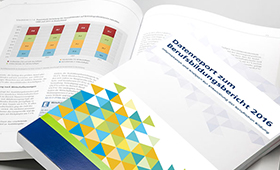Facts, figures and data on vocational education and training
BIBB publishes 2016 Data Report
21/2016 | Bonn, 27.04.2016

The Federal Institute for Vocational Education and Training (BIBB) has published its 2016 Data Report. The Data Report includes comprehensive information and analyses on the development of initial and continuing vocational education and training in Germany. It supplements the annual Federal Government Report on Vocational Education and Training, which has been adopted by the Federal Cabinet today.
The main thematic focus of this year’s Data Report is on analysing the possibilities and chances of acquiring higher education drop-outs for vocational training. VET experts surveyed by BIBB believe that this makes an important contribution towards stabilising company participation in training and the training and the skilled worker market even if it only applies to a limited spectrum of training occupations. Results of a BIBB survey conducted within the scope of the Reference Company System support this evaluation.
Although dual vocational education and training enjoys a good reputation amongst higher education students, in a survey carried out by BIBB in conjunction with the University of Maastricht only a small proportion of students stated that they would prefer dual VET to a degree course in retrospect. And an expert report drawn up by the University of Tübingen on behalf of BIBB shows that around a quarter of higher education drop-outs already subsequently go on to successful completion of dual vocational education and training. Students with a prior VET qualification are also ten percentage points more likely to pass their first degree than students who have not previously completed VET.
The Data Report also directs its attention at the integration into training and employment of persons from a migrant background, including against the background of the present refugee situation. In this area, the BIBB analyses show that the transition to training continues to be difficult and protracted, especially for young people from a migrant background who are not in possession of a higher education entrance qualification. Such persons are less likely to achieve a vocational qualification and thus run a higher risk of unemployment.
The effects on the training market caused by the migration of refugees remained limited last year due to the fact that the initial emphasis was on providing people with accommodation and basic supplies. However, the large number of young people amongst the refugees suggests that demand for training places will grow over the coming years. BIBB will dedicate further analyses to monitoring this develop-ment and will also make it a main thematic focus of next year’s Data Report.
The current situation on the training market continues to be characterised by increasing matching problems. It is clearly becoming more difficult from year to year to collate company training provision and young people’s demand for training places. This is particularly revealed by the circumstance that unfilled places as a proportion of company-based training provision has once again increased, from 6.9% to 7.5%. On the other hand, the number of unsuccessful applicants as a proportion of the officially identified demand for 2015 is still comparatively high at 13.4%. BIBB expects these trends to persist over the coming year.
A preliminary version (German language) of the BIBB Data Report to accompany the 2016 Report on Vocational Education and Training can be downloaded in free of charge in PDF format at www.bibb.de/datenreport-2016. The print version is expected to be available from July.
The 2016 Federal Government Report on Vocational Education and Training is available online at www.bmbf.de/de/berufsbildungsbericht-2740.html.
Reprint free of charge – voucher copy requested.